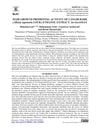 November 2023 in “Frontiers in Neuroendocrinology”
November 2023 in “Frontiers in Neuroendocrinology” Some people experience lasting sexual, psychological, and sleep problems after using finasteride or SSRI antidepressants, possibly due to similar underlying causes.
 December 2023 in “International Journal of Applied Pharmaceutics”
December 2023 in “International Journal of Applied Pharmaceutics” Moringa seed oil helped hair growth in rabbits, with the highest dose being most effective.
 44 citations,
June 2006 in “Biological & Pharmaceutical Bulletin”
44 citations,
June 2006 in “Biological & Pharmaceutical Bulletin” Androgen hormones cause hair follicle scarring in hair loss, and finasteride helps reduce it.
 9 citations,
January 2019 in “Postepy Dermatologii I Alergologii”
9 citations,
January 2019 in “Postepy Dermatologii I Alergologii” The skin acts like an endocrine organ, making hormones that affect skin diseases and respond to stress.
 4 citations,
January 2018 in “Elsevier eBooks”
4 citations,
January 2018 in “Elsevier eBooks” Hormones are crucial for regulating body functions and imbalances can lead to health issues.
 17 citations,
November 2014 in “American Journal of Physiology-gastrointestinal and Liver Physiology”
17 citations,
November 2014 in “American Journal of Physiology-gastrointestinal and Liver Physiology” Finasteride helps brain function in rats with liver-related brain issues.
 46 citations,
September 2014 in “Steroids”
46 citations,
September 2014 in “Steroids” Plant steroid hormones show growth, health, and medicinal benefits in various organisms, including potential for treating diseases.
 103 citations,
June 2006 in “British journal of sports medicine”
103 citations,
June 2006 in “British journal of sports medicine” The document concludes that better biomarkers are needed to detect long-term oral testosterone use in athletes.
 37 citations,
October 2006 in “Steroids”
37 citations,
October 2006 in “Steroids” New sulfur-containing steroid analogs show promise for more targeted medical treatments.
 11 citations,
July 2015 in “Gene”
11 citations,
July 2015 in “Gene” DHT affects bone growth by altering gene activity in osteoblasts, potentially complicating steroid use.
 2 citations,
May 2022 in “Diagnostics”
2 citations,
May 2022 in “Diagnostics” Vitamin D levels in hair don't match those in blood, so hair isn't a reliable indicator of Vitamin D status.
 1 citations,
January 2022 in “Rasayan journal of Chemistry”
1 citations,
January 2022 in “Rasayan journal of Chemistry” Albizia saponaria bark ethanol extract, particularly at 15%, promotes hair growth in rabbits.
 6 citations,
February 2020 in “Journal of Natural Products”
6 citations,
February 2020 in “Journal of Natural Products” A new compound from a sponge strongly inhibits an enzyme linked to male-pattern hair loss without being toxic at low levels.
 26 citations,
October 2011 in “International Journal of Biological Macromolecules”
26 citations,
October 2011 in “International Journal of Biological Macromolecules” Some newly made compounds are promising for treating enlarged prostate, hair loss, viruses, and prostate cancer, and might be better than current drugs.
 17 citations,
December 2004 in “Bioorganic & Medicinal Chemistry Letters”
17 citations,
December 2004 in “Bioorganic & Medicinal Chemistry Letters” Scientists found new, better-working inhibitors for a hormone-related enzyme.
 22 citations,
November 2011 in “Journal of Analytical Toxicology”
22 citations,
November 2011 in “Journal of Analytical Toxicology” Scientists have developed a new method to detect steroid abuse in athletes using cell-based tests, which could be the future of anti-doping methods.
 5 citations,
December 1979 in “Clinical and Experimental Dermatology”
5 citations,
December 1979 in “Clinical and Experimental Dermatology” Anti-androgens are effective for female acne but less so for male-pattern hair loss, with side effects similar to birth control pills.
 September 2024 in “Ahmar Metastasis Health Journal”
September 2024 in “Ahmar Metastasis Health Journal” Ginger and celery extracts did not significantly improve hair growth in rats.
 233 citations,
November 2002 in “The journal of investigative dermatology/Journal of investigative dermatology”
233 citations,
November 2002 in “The journal of investigative dermatology/Journal of investigative dermatology” Creating stronger blockers for skin enzymes might lead to better treatment for conditions like acne and excessive hair growth.
 2 citations,
September 2022 in “Cellular and molecular biology”
2 citations,
September 2022 in “Cellular and molecular biology” Agaricus bisporus derived β-Glucan could be an effective cervical cancer treatment with antimicrobial and antioxidant properties.
February 2025 in “Drug Testing and Analysis” All samples tested negative for banned substances, ensuring competition integrity.
 13 citations,
January 2017 in “Chemical & Pharmaceutical Bulletin”
13 citations,
January 2017 in “Chemical & Pharmaceutical Bulletin” Certain compounds, especially those with a propionic substituent, could potentially be new treatments for hair loss and similar disorders.
 14 citations,
April 2021 in “Biology”
14 citations,
April 2021 in “Biology” Thai rice bran extracts, especially from Tubtim Chumphae rice, can significantly reduce the activity of hair loss genes, with x-tocopherol showing potential as an anti-hair loss product.
 11 citations,
December 2018 in “Assay and Drug Development Technologies”
11 citations,
December 2018 in “Assay and Drug Development Technologies” Natural herbal compounds might treat certain medical conditions by reducing DHT levels, but more research is needed to confirm their effectiveness and safety.
 8 citations,
February 2022 in “Molecules”
8 citations,
February 2022 in “Molecules” Asparagus racemosus root extract reduced sebum and pore size in men but not in women.
March 2022 in “Research Square (Research Square)” Mushroom compounds may help treat hair loss better than Finasteride.
 November 2022 in “Journal of Herbal Medicine”
November 2022 in “Journal of Herbal Medicine” Certain compounds found in edible mushrooms may help treat hair loss.
 42 citations,
May 2003 in “Mini-reviews in Medicinal Chemistry”
42 citations,
May 2003 in “Mini-reviews in Medicinal Chemistry” New steroidal compounds could be effective for treating conditions related to 5α-reductase enzyme activity.
3 citations,
June 2018 in “Bioorganic & medicinal chemistry” Compounds 4, 4b, and 4c effectively inhibit an enzyme linked to testosterone conversion without significant toxicity.
 47 citations,
November 2012 in “Expert Opinion on Therapeutic Patents”
47 citations,
November 2012 in “Expert Opinion on Therapeutic Patents” The document concludes that research on sulfatase inhibitors should continue due to their potential in treating various diseases, despite some clinical trial failures.


























